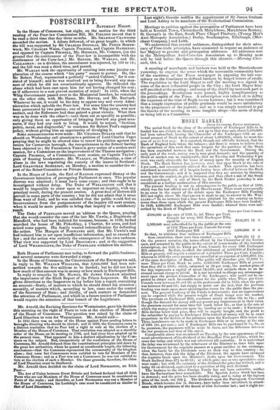POSTSCRIPT
SATURDAY NIGHT.
In the House of Commons, last night, on the motion for the third reading of the Poor, law Commission Bill, Mr. FIELDER moved that it In the House of Commons, last night, on the motion for the third reading of the Poor, law Commission Bill, Mr. FIELDER moved that it be read a third time that day three months. Mr. SHARMAN CRAWFORD seconded the motion. A debate followed, of no great length ; in which the bill Was supported by Sir CHARLES DOUGLAS, Mr. PETER BORTH- WICK, Mr. CHARLES WOOD, Captain PoLumt, and Captain Hammon; and opposed by Captain PECHELL, Mr. llnentny, Mr. COBDEN, (on the ground that the continuance of the Poor-law is incompatible with the continuance of the Corn-law,) Mr. BENNIE, Mr. WAKLEY, and Mr. CALLAGHAN: on a division, the amendment was rejected, by 133 to 18; and the bill was read a third time, and passed.
Mr. WAHLEY took the opportunity of entering into some jocular ex- planation of the course which "his party" meant to pursue. He, like Sir Robert Peel, represented a perfectly "united Cabinet," for it con- sisted of himself; and he was resolved not to bring forward any mea- sure of which he did not conscientiously approve. He ridiculed the abuse which had been cast upon him for not having changed his seat ; as if adherence to a seat proved mutation of mind! In 1835, when the Whig Government passed over to the Ministerial benches, he remained on the other side, with Mr. Flume, Mr. Harvey, and Mr. Roebuck. Wherever he sat, it would be his ditty to oppose any and every Admi- nistration which upholds the Poor-law. For some time the country had been persecuted by two parties ; one of them, the Whig party, was now extinct, and the Reformers had thus gained a great victory. What then was to be done with the other ?—turn them out as speedily as possible; only giving them an opportunity of bringing forward any good mea- sures, if they had any such to bring. It would be unjust, "factious, paltry, mean, and disgraceful," to condemn Sir Robert Peel's supposed policy, without giving him an opportunity of divulging it. Some announcements were made : Mr. CHARLES HULLER said that he should on Wednesday call attention to a petition of Lord Charles Paget praying that he might be allowed time to renew his petition against the return for Carnarvon borough, the recognizances to the former having been objected to ; Sir FREDERICK Tmoica gave notice of a motion next session, for a Committee on the improvement of the Thames navigation ; Captain PECHELL, of a Committee, next session, on Captain Taylor's plan of floating breakwaters ; Mr. WAKLEY, on Wednesday, a case of abuse in the laws regulating the custody of the insane in Scotland ; Lord GRANVILLE SOMERSET, on Monday, a motion to consider the re- port of the Select Committee on Private Business.
In the House of Lords, the Earl of RADNon expressed dismay at the Government intention of proroguing Parliament at once. The popular distress was admitted ; it must have some cause; and that ought to be investigated without delay. The Duke of Ws:Lyn:wort said that it would be impossible to enter upon so important an inquiry, with any practical result, during the present session. A great deal of distress did prevail in some parts of the country ; but he did not admit that it arose from want of food ; and he was satisfied that the public would feel no inconvenience from the postponement of the inquiry till next session, when it would be more possible to bring that inquiry to a satisfactory result The Duke of PORTLAND moved an 'address to the Queen, praying that she would consider the case of the late Mr. Unwin, a Magistrate of Mansfield, who had been indicted for trespass, because, in 1839, he had searched the house of Mr. Pitkethley, a Chartist, for arms, and had seized some papers. His family wanted indemnification for defending the action. The Marquis of NORMANBY said, that Mr. Unwin's zeal had induced him to act upon insufficient information, and to exceed the law ; and the action was entirely the consequence of his own rashness. That view was supported by Lord BROUGHAM; and at the suggestion of Lord WHARNCLIFFE, the Duke of PORTLAND withdrew his motion.


























 Previous page
Previous page